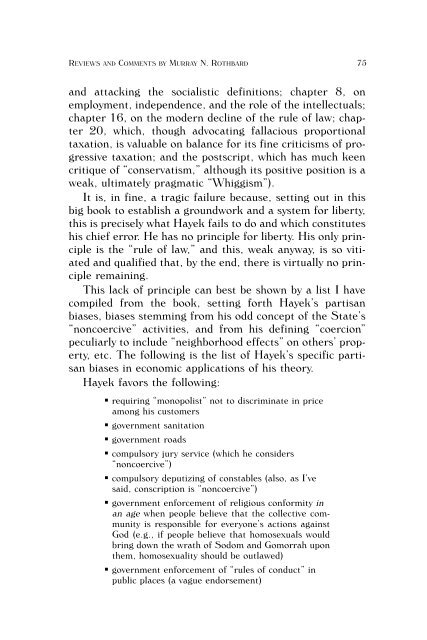Murray N. Rothbard vs. the Philosophers - Ludwig von Mises Institute
Murray N. Rothbard vs. the Philosophers - Ludwig von Mises Institute
Murray N. Rothbard vs. the Philosophers - Ludwig von Mises Institute
Create successful ePaper yourself
Turn your PDF publications into a flip-book with our unique Google optimized e-Paper software.
REVIEWS AND COMMENTS BY MURRAY N. ROTHBARD 75<br />
and attacking <strong>the</strong> socialistic definitions; chapter 8, on<br />
employment, independence, and <strong>the</strong> role of <strong>the</strong> intellectuals;<br />
chapter 16, on <strong>the</strong> modern decline of <strong>the</strong> rule of law; chapter<br />
20, which, though advocating fallacious proportional<br />
taxation, is valuable on balance for its fine criticisms of progressive<br />
taxation; and <strong>the</strong> postscript, which has much keen<br />
critique of “conservatism,” although its positive position is a<br />
weak, ultimately pragmatic “Whiggism”).<br />
It is, in fine, a tragic failure because, setting out in this<br />
big book to establish a groundwork and a system for liberty,<br />
this is precisely what Hayek fails to do and which constitutes<br />
his chief error. He has no principle for liberty. His only principle<br />
is <strong>the</strong> “rule of law,” and this, weak anyway, is so vitiated<br />
and qualified that, by <strong>the</strong> end, <strong>the</strong>re is virtually no principle<br />
remaining.<br />
This lack of principle can best be shown by a list I have<br />
compiled from <strong>the</strong> book, setting forth Hayek’s partisan<br />
biases, biases stemming from his odd concept of <strong>the</strong> State’s<br />
“noncoercive” activities, and from his defining “coercion”<br />
peculiarly to include “neighborhood effects” on o<strong>the</strong>rs’ property,<br />
etc. The following is <strong>the</strong> list of Hayek’s specific partisan<br />
biases in economic applications of his <strong>the</strong>ory.<br />
Hayek favors <strong>the</strong> following:<br />
requiring “monopolist” not to discriminate in price<br />
among his customers<br />
government sanitation<br />
government roads<br />
compulsory jury service (which he considers<br />
“noncoercive”)<br />
compulsory deputizing of constables (also, as I’ve<br />
said, conscription is “noncoercive”)<br />
government enforcement of religious conformity in<br />
an age when people believe that <strong>the</strong> collective community<br />
is responsible for everyone’s actions against<br />
God (e.g., if people believe that homosexuals would<br />
bring down <strong>the</strong> wrath of Sodom and Gomorrah upon<br />
<strong>the</strong>m, homosexuality should be outlawed)<br />
government enforcement of “rules of conduct” in<br />
public places (a vague endorsement)


